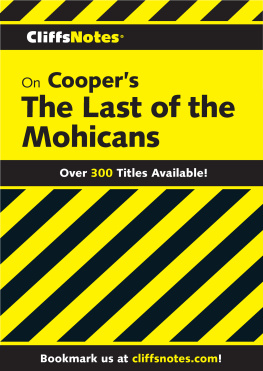Jeffrey Fisher - CliffsNotes on Shaws Major Barbara & St. Joan
Here you can read online Jeffrey Fisher - CliffsNotes on Shaws Major Barbara & St. Joan full text of the book (entire story) in english for free. Download pdf and epub, get meaning, cover and reviews about this ebook. year: 2017, publisher: HMH Books, genre: Romance novel. Description of the work, (preface) as well as reviews are available. Best literature library LitArk.com created for fans of good reading and offers a wide selection of genres:
Romance novel
Science fiction
Adventure
Detective
Science
History
Home and family
Prose
Art
Politics
Computer
Non-fiction
Religion
Business
Children
Humor
Choose a favorite category and find really read worthwhile books. Enjoy immersion in the world of imagination, feel the emotions of the characters or learn something new for yourself, make an fascinating discovery.
- Book:CliffsNotes on Shaws Major Barbara & St. Joan
- Author:
- Publisher:HMH Books
- Genre:
- Year:2017
- Rating:4 / 5
- Favourites:Add to favourites
- Your mark:
- 80
- 1
- 2
- 3
- 4
- 5
CliffsNotes on Shaws Major Barbara & St. Joan: summary, description and annotation
We offer to read an annotation, description, summary or preface (depends on what the author of the book "CliffsNotes on Shaws Major Barbara & St. Joan" wrote himself). If you haven't found the necessary information about the book — write in the comments, we will try to find it.
This CliffsNotes guide includes everything youve come to expect from the trusted experts at CliffsNotes, including analysis of the most widely read literary works.
CliffsNotes on Shaws Major Barbara & St. Joan — read online for free the complete book (whole text) full work
Below is the text of the book, divided by pages. System saving the place of the last page read, allows you to conveniently read the book "CliffsNotes on Shaws Major Barbara & St. Joan" online for free, without having to search again every time where you left off. Put a bookmark, and you can go to the page where you finished reading at any time.
Font size:
Interval:
Bookmark:
Copyright 1999 Houghton Mifflin Harcourt Publishing Company
All rights reserved.
www.hmhco.com
cliffsnotes.com
For information about permission to reproduce selections from this book, write to or to Permissions, Houghton Mifflin Harcourt Publishing Company, 3 Park Avenue, 19th Floor, New York, New York 10016.
The publisher and the author make no representations or warranties with respect to the accuracy or completeness of the contents of this work and specifically disclaim all warranties, including without limitation warranties of fitness for a particular purpose. No warranty may be created or extended by sales or promotional materials. The advice and strategies contained herein may not be suitable for every situation. This work is sold with the understanding that the publisher is not engaged in rendering legal, accounting, or other professional services. If professional assistance is required, the services of a competent professional person should be sought. Neither the publisher nor the author shall be liable for damages arising herefrom. The fact that an organization or website is referred to in this work as a citation and/or a potential source of further information does not mean that the author or the publisher endorses the information the organization or website may provide or recommendations it may make. Further, readers should be aware that Internet websites listed in this work may have changed or disappeared between when this work was written and when it is read.
Trademarks: CliffsNotes, the CliffsNotes logo, Cliffs, cliffsnotes.com, and all related trademarks, logos, and trade dress are trademarks or registered trademarks of Houghton Mifflin Harcourt Publishing Company. All other trademarks are the property of their respective owners. Houghton Mifflin Harcourt is not associated with any product or vendor mentioned in this book.
eISBN 978-0-544-18268-4
v1.0917
It is with good reason that Archibald Henderson, official biographer of his subject, entitled his work George Bernard Shaw: Man of the Century. Well before Shaws death at the age of ninety-four, this famous dramatist and critic had become an institution. Among the literate, no set of initials were more widely known than G. B. S. Born on July 26, 1856, in Dublin, Ireland, Shaw survived until November 2, 1950. His ninetieth birthday in 1946 was the occasion for an international celebration, the grand old man being presented with a festschrift, entitled GBS 90, to which many distinguished writers contributed. A London publishing firm bought space in the Times to voice its greetings:
GBS
Hail to thee, blithe spirit!
Shaw was the third child and only son in a family which he once described as shabby but genteel. His father, George Carr Shaw, was employed as a civil servant and later became a not too successful merchant. Shaw remembered especially his fathers alcoholic antics; the old man was a remorseful, yet an unregenerate drinker. It was from his father that Shaw inherited his superb comic gift. Lucinda Gurley Shaw, the mother, was a gifted singer and music teacher; she led her son to develop a passion for music, particularly operatic music. At an early age, Shaw had memorized many of the works of Mozart, whose fine workmanship he never ceased to admire. Somewhat later, he taught himself to play the pianoin the Shavian manner.
One of the maxims in The Revolutionists Handbook, appended to Man and Superman, reads: He who can, does. He who cannot, teaches. Shaw, who was to insist that all art should be didactic, viewed himself as a kind of teacher, yet he himself had little respect for schoolmasters and formal education. First, his uncle, the Reverend George Carroll, tutored him. Then at the age of ten, Shaw became a pupil at Wesleyan Connexional School in Dublin and later attended two other schools for short periods of time. He hated them all and declared that he had learned absolutely nothing. But Shaw possessed certain qualities which are not always developed in a classroomfor example, an inquisitive mind and a boundless capacity for independent study. Once asked about his early education, he replied: I can remember no time at which a page of print was not intelligible to me and can only suppose I was born literate. He went on to add that by the age of ten, he had saturated himself in the works of Shakespeare and also in the Bible.
A depleted family bank account led Shaw to accept employment as a clerk in a land agency office when he was sixteen. He was unhappy and, determined to become a professional writer, resigned after five years of service and joined his mother, who was then teaching music in London. The year was 1876. During the next three years, he allowed his mother to support him, and he concentrated largely on trying to support himself as an author. No less than five novels came from his pen between the years 1879 and 1883, but it was soon evident that Shaws genius would not be fully revealed as a novelist, but as a playwright.
In 1879, Shaw was induced to accept employment in a firm promoting the new Edison telephone, his duties being those of a right-of-way agent. He detested the task of interviewing residents in the East End of London and endeavoring to get their permission for the installation of telephone poles and equipment. A few months of such work was enough for him. In his own words, this was the last time that he sinned against his nature by seeking to earn an honest living.
The year 1879 had greater significance for Shaw. He joined the Zetetical Society, a debating club, the members of which held lengthy discussions on such subjects as economics, science, and religion. Soon he found himself in demand as a speaker, and thus he became a regular participant at public meetings. At one such meeting held in September 1882, he listened spellbound to Henry George, an apostle of Land Nationalization and the Single Tax. Shaw credits the American lecturer and author with having aroused his interest in economics and social theory; previously, Shaw had chiefly concerned himself with the conflict between science and religion. When Shaw was told that no one could do justice to Georges theories without being familiar with the theories of Karl Marx, Shaw promptly read a French translation of Das Kapital, no English translation then being available. He was immediately converted to socialism.
The year 1884 is also a notable one in the life of Bernard Shaw (as he preferred to be called). After reading a tract entitled Why Are the Many Poor? and learning that it was published by the Fabian Society, he appeared at the societys next meeting. The intellectual temper of this group, which included such distinguished men as Havelock Ellis, immediately attracted him. He was accepted as a member on September 5 and was elected to the Executive Committee in January. Among the debaters at Zetetical Society was Sidney Webb, a man whom Shaw recognized as his natural complement. He easily persuaded Webb to become a Fabian. The two, along with the gifted Mrs. Webb, became the pillars of the society which preached the gospel of constitutional and evolutionary socialism. Shaws views, voiced in public parks and meeting halls, are expounded at length in The Intelligent Womans Guide to Capitalism and Socialism (1928); many of his ideas also find a place in his dramas.
In the next stage of his career, Shaw emerged as a literary, music, and art critic. Largely because of the influence of William Archer, the distinguished dramatic critic now best remembered as the editor and translator of Ibsen, Shaw became a member of the reviewing staff of the Pall Mall Gazette in 1885. Earlier, he had ghostwritten some music reviews for G. L. Lee, with whom his mother had long been associated as a singer and as a music teacher. But this new assignment provided Shaw with his first real experience as a critic. Not long afterward, and again through the assistance of William Archer, Shaw added to these duties those of an art critic on the widely influential
Next pageFont size:
Interval:
Bookmark:
Similar books «CliffsNotes on Shaws Major Barbara & St. Joan»
Look at similar books to CliffsNotes on Shaws Major Barbara & St. Joan. We have selected literature similar in name and meaning in the hope of providing readers with more options to find new, interesting, not yet read works.
Discussion, reviews of the book CliffsNotes on Shaws Major Barbara & St. Joan and just readers' own opinions. Leave your comments, write what you think about the work, its meaning or the main characters. Specify what exactly you liked and what you didn't like, and why you think so.













